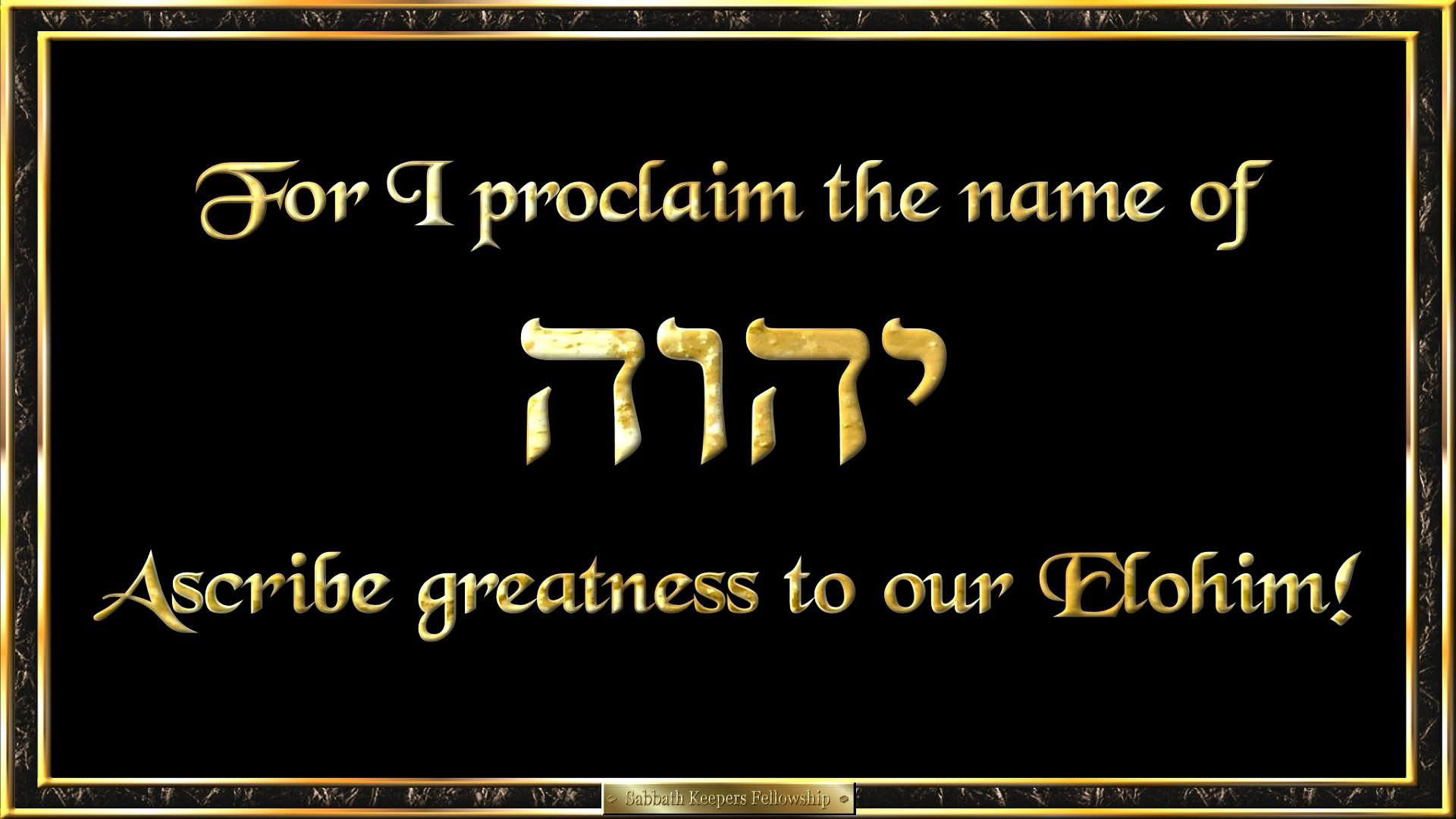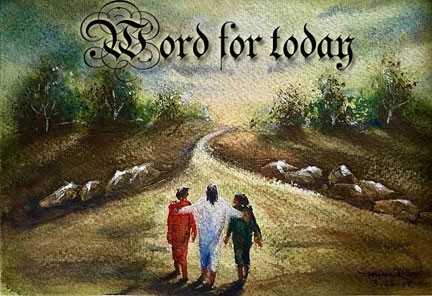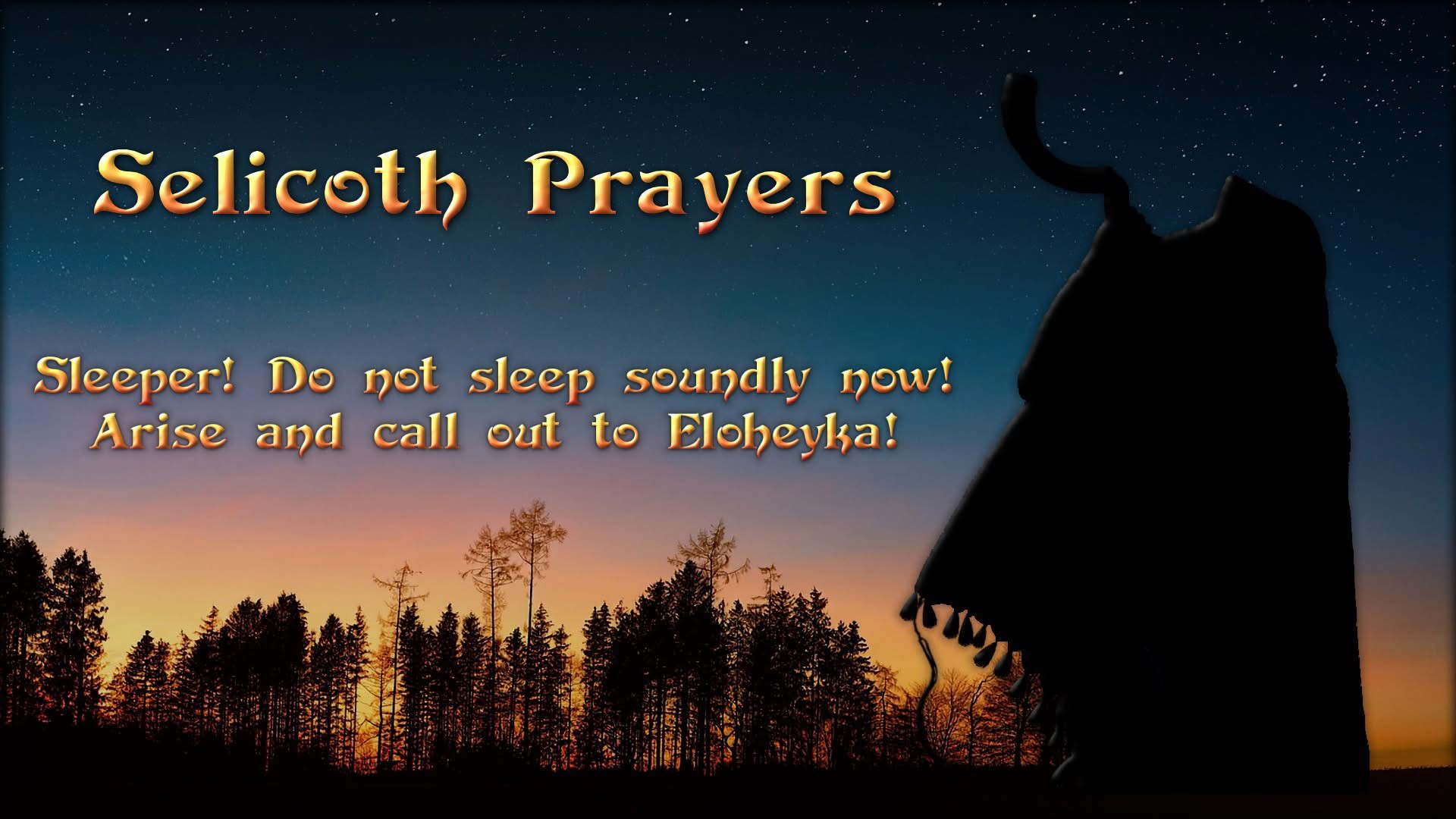Watch
Events
Articles
Market
More
Thought for Today: Wednesday October 01
YHVH places a seal on us when we receive the Moshiach. And that seal is a person called: the Holy Spirit… The Holy Spirit is also YHVH’s pledge. He not only seals the arrangement, but He represents YHVH’s commitment to see us through. Finally, the Holy Spirit witnesses to us, by the Scriptures and within our hearts. What a wonderful thing to know the Holy Spirit is given to us as a Seal; a Pledge and a Witness! May each of these give us new assurance of YHVH’s unchanging Love for us, and give us confidence as we seek to live for Him.



Paul appointed Timothy and Titus to organize and supervise regional networks of home fellowships in the first century. Timothy's region was the Ephesus metropolitan area. Titus' region was the Island of Crete.
What qualities do you think Timothy and Titus had that prompted Paul to appoint them to this task instead of Aquila, Luke, or Apollos?



FROM THIS WEEK’S TORAH PORTION – HA’AZYNU:
“Give ear, O heavens, and let me speak; And hear, O earth, The words of my mouth. Let my instruction fall as rain, My speech drop down as dew, As fine rain on the tender plants, And as showers on the grass. For I proclaim the Name of YHWH, Ascribe greatness to our Elohim. The Rock! His work is perfect, For all His ways are judgment, An Ěl of truth and without unrighteousness, Righteous and straight is He!”




https://connect.torahtent.com
You are invited to join our forum and engage in conversation.



093025 / 7th day of the 7th month 5786
WORD FOR TODAY “this shows how evil our heart is”: Gideon reigned 40 years. Jdg 8:33 Then it came about, as soon as Gideon was dead, that the sons of Israel again played the harlot with the Baals, and made Baal-berith their god.
WISDOM FOR TODAY: Pro 22:8 He who sows injustice reaps trouble, and the rod of his angry outburst will fail.
Ask the LORD how you can serve HIM better
www.BGMCTV.org




9/30/2025
THE SELICHOTH PRAYERS – YAMYM NORAYM
The Selichoth Prayers – Standard Edition, can be found at:
https://sabbathkeepersfellowsh....ip.org/articles-book
YOM SHLISHY – THIRD DAY OF THE WEEK
“Then you will call upon Me and come and pray to Me, and I will listen to you. And you will seek Me and find Me, when you search for Me with all your heart.”
Blessed be He who spoke and the world was; Blessed be He – and blessed be His Name.
TEHILLAH 51
Be gracious to me, O Elohym, according to Your mercy; according to the greatness of Your compassion blot out my transgressions. Wash me thoroughly from my iniquity and cleanse me from my sin. For I know my transgressions, and my sin is ever before me. Against You, You only, I have sinned and done what is evil in Your sight, so that You are justified when You speak and blameless when You judge. Behold, I was brought forth in iniquity, and in sin my mother conceived me. Behold, You desire truth in the innermost being, and in the hidden part You will make me know wisdom. Purify me with hyssop, and I shall be clean; wash me, and I shall be whiter than snow. Make me to hear joy and gladness, let the bones which You have broken rejoice. Hide Your face from my sins and blot out all my iniquities. Create in me a clean heart, O Elohym, and renew a steadfast spirit within me. Do not cast me away from Your presence and do not take Your Ruach Haqodesh from me. Restore to me the joy of Your salvation and sustain me with a willing spirit. Then I will teach transgressors Your ways, and sinners will be converted to You. Deliver me from blood-guiltiness, O Elohym, the Elohym of my salvation; thenmy tongue will joyfully sing of Your righteousness. Adonai, open my lips, that my mouth may declare Your praise. For You do not delight in sacrifice, otherwise I would give it; You are not pleased with burnt offering. The sacrifices of Elohym are a broken spirit; a broken and a contrite heart, O Elohym, You will not despise. By Your grace do excellence to Zion; build the walls of Yerushalayim. Then You will delight in righteous sacrifices, in burnt offering and whole burnt offering; then young bulls will be offered on Your altar.
TEHILLAH 27
YHWH is my light and my salvation; whom shall I fear? YHWH is the defense of my life; whom shall I dread? When evildoers came upon me to devour my flesh, my adversaries and my enemies, they stumbled and fell. Though a host encamp against me, my heart will not fear; though war arise against me, in spite of this I shall be confident. One thing I have asked from YHWH, that I shall seek: that I may dwell in the house of YHWH all the days of my life, to behold the beauty of YHWH, and to meditate in His temple. For in the day of trouble He will conceal me in His tabernacle; in the secret place of His tent He will hide me; He will lift me up on a rock. And now my head will be lifted up above my enemies around me, and I will offer in His tent sacrifices with shouts of joy; I will sing, yes, I will sing praises to YHWH. Hear, YHWH, when I cry with my voice, and be gracious to me and answer me. When You said, “Seek My face,” my heart said to You, “Your face, YHWH, I shall seek.” Do not hide Your face from me, do not turn Your servant away in anger; You have been my help; do not abandon me nor forsake me, O Elohym of my salvation! For my father and my mother have forsaken me, but YHWH will take me up. Teach me Your way, YHWH, and lead me in a level path because of my foes. Do not deliver me over to the desire of my adversaries, for false witnesses have risen against me, and such as breathe out violence. I would have despaired unless I had believed that I would see the excellence of YHWH in the land of the living. Wait for YHWH; be strong and let your heart take courage; yes, wait for YHWH.
AL TEIRADAM
Slumberer! Do not soundly sleep now; abandon your tiredness. Distance yourself from the sinful ways of people and behold the ways of your lofty One. Hasten to worship the Rock who preceded all, as the illuminating stars hasten. It is enough for you; why do you soundly sleep? Arise and call to your Elohym!
Awaken to see His heavens and the handiwork of His fingers. And gaze upon the tents of His heights – suspended upon His arms, and upon the stars, His seals, the engravings of His signets. Fear His awesomeness and anticipate His salvations lest excellent times elevate you and your heart be lifted in haughtiness. Why do you soundly sleep? Arise and call to your Elohym!
Go out at midnight in the footsteps of men of note, upon whose tongues are praises and whose insides are not full of duplicity and deceit; their nights are spent in prayers and fasting. In their heart they seek paths to Elohym and they have places in His throne – their way of life is a ladder to ascend unto YHWH, your Elohym. Why do you soundly sleep? Arise and call to your Elohym!
Let your eyes stream with tears and be regretful for transgressions; plead before your Maker and do not be involved with evil doers. Lower greatly your pride and seize excellence for it is pleasant. Honor Elohym with your wealth, the time that saviors shall ascend and your throngs will lift their voices, prepare to encounter your Elohym! Why do you soundly sleep? Arise and call to your Elohym!
The destitute, whose origin is dust, whence his wisdom? And the superiority of man over beast is naught except for those who see the Rock of their esteem – sight of the heart, not of the eye; and see the sources of their origin, which are better than wine, for only through such, O you of flesh and blood, shall you find your Elohym. Why do you soundly sleep? Arise and call to your Elohym!
Before Elohym, “I will be who I will be,” who does all that He desires, who brings death and gives life, who lowers to the grave and resurrects – stand for judgment and live, and abandon rebellion and treachery, saying: When? And where? What is below the earth? What is above the angels? Rather, perfect shall you be with YHWH, your Elohym. Why do you soundly sleep? Arise and call to your Elohym!
Y’IRUNIY RA’IYONAY
My thoughts have awakened me, the counsel of my heart and its desire is to utter the words of my supplication with songs of Elohym and His praises. I will not grant sleep to my eyes, at midnight because of Him, so as to behold the pleasantness of YHWH, and to delve within His sanctuary.
I awoke and immediately contemplated: “Who is it that woke me?” and behold! the set-apart One who sits and awaits praises, it is He who encouraged me and gave to my ears the sense of hearing, and strengthened and fortified me. And so long as He restores my spirit I shall bless He who has advised me to accept Him, the Rock to whom the soul belongs and whose handiwork is the body, so as to behold the pleasantness of YHWH, and to delve within His sanctuary.
And I shall pray before Him and take pleasure in prayer, and my tears shall break through His clouds and be sweeter than honey and sweets. My heart will be uplifted in His eyes when it melts as if it were wax, as a slave before his master who withers from fear of him, but when he recalls his praises, he will forget all his suffering, so as to behold the pleasantness of YHWH, and to delve within His sanctuary.
Night, be still and pass very slowly and delay the arrival of the morning, until the servant shall find grace – through his entreaties – with his master. He will pour out the blood of his heart and liver and relate the plagues of his heart. And the worshipper will be unified with the King at His festival, and he will sing and declaim his parable for the sake of his Banner and his object of praise, so as to behold the pleasantness of YHWH, and to delve within His sanctuary.
Behold, he is a servant of servants before the King of kings, standing with hands heavy and tears flowing, with his limbs subservient to You for as long as he continues to live, and all his limbs offer thanks to You. Forgive his evil deeds whose weight is as the sand, so as to behold the pleasantness of YHWH, and to delve within His sanctuary.
VIDDUY
I make my sin known to You and do not conceal my iniquity; for I said that it is proper that I confess my transgressions to YHWH, and as a result, You have forgiven the iniquity of my sins. And it is stated: He who conceals his transgressions will not succeed, but he, who admits and forsakes them, shall be dealt with mercifully.
Please, YHWH, our Elohym, Elohym of our forefathers, let our prayer come before You, and do not hide Yourself from our supplication – for we are not so insolent nor so obstinate to say before You, YHWH, our Elohym, Elohym of our forefathers, “we are righteous and have not sinned,” rather, truly we have sinned – we as well as our forefathers and our household members:
(With each of the following statements, bring your right fist to your chest, over your heart.)
We have been guilty. We have betrayed. We have robbed. We have spoken gossip and slander. We have caused iniquity. We have caused wickedness. We have acted wantonly. We have extorted. We have accused falsely. We have given bad advice. We have lied. We have acted frivolously. We have rebelled. We have infuriated. We have committed adultery. We have been deviant. We have committed iniquity. We have transgressed willfully. We have oppressed. We have been obstinate. We have been wicked. We have corrupted ourselves and others. We have committed abominations. We have strayed and caused others to stray, and we have veered from Your excellent commandments and laws, but it has not benefited us. But You are righteous regarding all that has befallen us, for You have acted with truth, and it is we who have caused wickedness.
YHWH, DALU EYNAY LAMAROM
YHWH, my eyes are raised to the heavens. In my distress I call out to YHWH. My spirit was enveloped within me from my excessive anger and grief, and I poured out my soul before YHWH. Yah, hearken to my statement and perform for me a sign for excellence. Many have You performed, YHWH. I became destitute, and He saved me, El, righteous and a savior. For Your salvation I hope, YHWH. When my enemy rises up against me, my heart shall not fear, and I shall rely upon You, YHWH. My hand is raised through You, my Fortress, and not through my sword, for not through the sword and the spear does YHWH save. My enemies have prevailed, and above me they raise themselves. With regard to these will You be restrained, YHWH? Why do You conceal Your countenance while the enemy surrounds me? A zealous and vengeful El is YHWH. I place counsel in my soul, and I grieve within my heart. Will YHWH forsake me forever? For Your mercy I have hoped, because for You, YHWH, I have waited. You will answer me, YHWH, my Elohym.
EILEYKA YHWH
Toward You, YHWH, I have raised up my eyes; hear the sound of my pleas as befits Your great kindness. I have trusted in Your Name and have spread out my palms; I have taken words and have come unto You. My sorrows have been overpowering and my groans have increased, for all of my sins have You set before You. My delicate soul dissipates from grief; release from anxiety the soul of Your servant. Remove my sin, O Elohym of my salvation; also my tears may You place in Your flask. In times of anger, Your mercy may You recall and reconsider, and gladden and console the soul of Your servant.
Our Father, our King, You are our Father! Our Father, our King, we have no King but You! Our Father, our King, have mercy on us! Our Father, our King, be gracious to us and answer us, although we do not possess excellent deeds.
Deal with us with righteousness and kindness for the sake of Your great Name, and save us. And we know not what more to do, but our eyes look to You. Recall Your mercies and kindnesses, YHWH, for they have existed from ever. May Your kindness be upon us, YHWH, as we have hoped in You.
QADDISH
Exalted and sanctified be His great Name in the world that He created according to His will. May His kingdom reign, and may He cause His redemption to sprout, and may He hasten the coming of His Mashiach in your lifetime and in your days and in the lifetime of the entire house of Yisrael, speedily and very soon; and let us say: Amein!
May His great Name be blessed forever and to all eternity.
Blessed, lauded, esteemed, exalted, extolled, honored, upraised, and praised be the Name of the set-apart One; Blessed be He; above all the blessings, songs, praises and words of consolation that may be uttered in the world; and let us say: Amein!
May your prayers and pleas be accepted together with the prayers and pleas of the entire house of Yisrael before our Father in heaven and earth, in the name of Yehoshua HaMashiach; and let us say: Amein!
May there be abundant shalom from heaven, life, contentment, salvation, consolation, deliverance, healing, redemption, pardon, atonement, comfort and relief for us and for His entire nation Yisrael; and let us say: Amein!
HON TAHON
Be merciful to Your children who are returning to You, and who stand before You with trepidation, fearful of the time they will be called to judgment; it is for that reason that they come in distress. Recall compassion on the Day of Judgment; do away with anger and wrath at the time You will judge those who fear You and those who dwell on Your Name – they who are sitting in judgment. Bring near to me the year of the Redeemer, and redeem me; upon restful waters, O Elohym, lead me, and recall for me the merit of the perfect man, Yehoshua HaMashiach, and place me like a seal upon Your heart. Amein!




Something that causes such confusion with the Paul’s letters today is, we are reading them through two thousand years of tradition and man made doctrine while trying to defend those same traditions and doctrines that have no defense. We can’t say on one had Paul writes the law was done away with while on the other hand he writes 1 Thessalonians 4:7— 8, “For God has not called us to impurity, but to holiness. Anyone, then, who rejects this command does not reject man but God, the very One who gives you His Holy Spirit.” Paul is explaining how to apply Leviticus and Ezekiel to shelves of the people who would have first read his letter.


